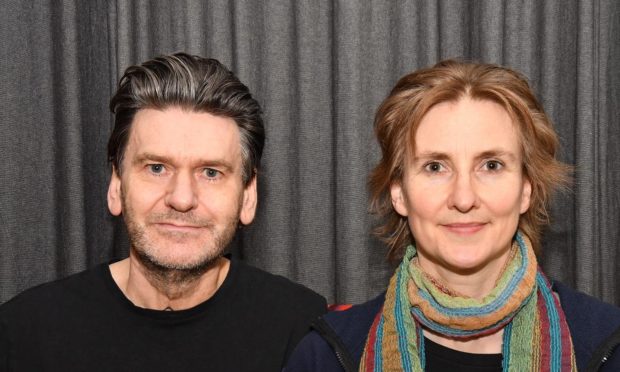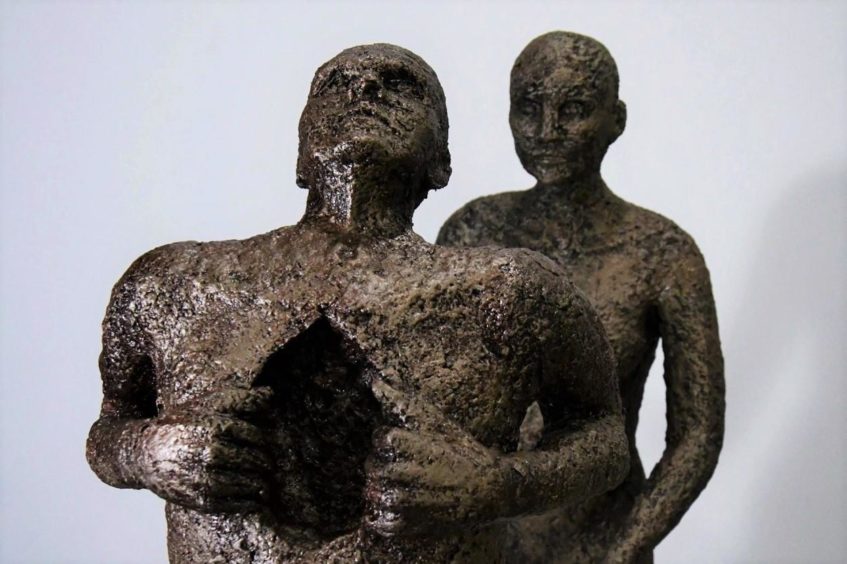An Aberdeen artist who spent 101 days without a functioning heartbeat before a life-saving transplant is hoping a special exhibition will raise awareness of Scotland’s new “opt-out” organ donation law.
Brian Keeley, an artist and PhD student at Aberdeen University, wound up in a coma after suffering a heart attack and organ failure on holiday in 2013.
The 56-year-old spent two months fighting for his life in intensive care before being put forward for a new heart, and eventually making a full recovery thanks to his donor.
Now Mr Keeley has launched a joint exhibition with his 45-year-old artist wife, Bibo, to coincide with Scotland’s new “presumed consent” organ donation law which has come into effect.
Using a range of visual art forms, the couple’s exhibition The Shared Heart documents the parallel journeys of the husband and wife, through portraits, photographs and video, as they navigated Mr Keeley’s illness and recovery together.
Told to “prepare for worst”
He said: “While holidaying in 2013, I suffered a heart attack, was airlifted to hospital and placed into a coma.
“I had a cardiac arrest and stroke and weeks later, when I regained consciousness, I was unable to move or speak while life-support machines took over the functions of my heart, lungs, and kidneys.
“It was a traumatic and frightening time, especially for my wife who had been told to prepare for the worst.”
However, after two months in intensive care, his condition improved and eventually Mr Keeley was stable enough to be put forward to receive a life-saving heart transplant.
“Since then I’ve used my personal experience as a heart transplant recipient to inform my artwork, and more recently my PhD research which focuses on representations of heart transplantation in contemporary art and visual culture,” the second year student added.
During a tough time in hospital, Mrs Keeley documented her husband’s illness and recovery through her camera lens, the photos of which will feature in the exhibition alongside her husband’s portraits of NHS staff who cared for him.
Mrs Keeley said: “While Brian was in intensive care I documented his illness and long recovery with photography, which allowed Brian to see his journey from my perspective, to help him understand the severity of his situation, and to show how he was attached to the many machines that were keeping him alive.”
Alongside those photos and portraits, a new collaborative sculpture has also been created for the exhibition.
Entitled Care, it expresses a fundamental aspect of the Old Aberdeen couple’s personal experiences of organ donation and heart transplantation.
“Harrowing memories”
And going forward Mrs Keeley will add a short film to the mix, based on letters she wrote to her ill husband as her way of feeling connected to him when he couldn’t communicate, as well as Mr Keeley’s harrowing memories of living without a functioning heartbeat for 101 days before his transplant.
That project will merge moving image, sound and spoken word to create a vivid and evocative account of the experience of critical illness from both sides of the intensive care bed.
Mr Keeley added: “This is the first time that we will revisit the written accounts, which will be very emotional for us, but we believe it is important to encourage informed conversation around organ donation and transplants.
“This exhibition has not only given us an opportunity to collaborate on projects that document our journey through what was a very difficult time in our lives, but it also allows us to share our story with others which we hope will raise awareness of how organ donation can save lives.”
The Shared Heart is being hosted by the university’s George Washington Wilson Centre for Visual Culture and supported by Aberdeen City Council’s creative funding programme.
It’s also online.

